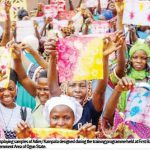•Calls for policy framework to tackle barriers digital access
The President and Chief Executive Officer of the Digital Bridge Institute (DBI), Mr. David Daser, has called on the Federal Government to urgently develop a comprehensive policy framework to eliminate the structural and systemic barriers preventing over 27 million Nigerians living with disabilities from accessing digital education and quality employment opportunities.
Speaking in Abuja at a sensitization workshop themed “Digital Citizenship for Persons with Disability,” organized by the Nigerian Communications Commission (NCC), Daser warned that Nigeria’s drive towards a digital future risks leaving a significant portion of its population behind if deliberate efforts are not made to include Persons With Disabilities (PWDs) in the digital ecosystem.
Daser noted, “It is imperative that no one is left behind, especially the over 27 million Nigerians with disabilities, as we shape Nigeria’s digital future.” He emphasized that inclusion of persons with disabilities in digital citizenship is not an act of charity or benevolence but a matter of justice and equal rights.
Delivering his goodwill address titled “Empowering All: Advancing Digital Citizenship and Inclusion for Persons with Disabilities,” Daser stressed that the time has come to dismantle all impediments limiting PWDs from fully participating in education, employment, governance, and healthcare in the digital space.
“Empowering PWDs in the digital space means not only providing access to technology but also ensuring that they have the skills, support systems, and confidence to thrive as equal digital citizens,” he declared.
“Whether it’s through accessible user interfaces, screen readers, inclusive content design, or disability-aware policy frameworks, we must remove the structural and systemic barriers to full participation.”
Commending the NCC for taking the lead in hosting the sensitization workshop, Daser applauded the Commission for demonstrating “not just regulatory foresight, but a human-centered commitment to national development.”
He underscored DBI’s commitment to the cause, saying:
“At DBI, we are proud of the work we’ve done in this space. Our partnership with organisations such as Sightsavers has allowed us to develop and deliver digital skills programmes tailored specifically to persons with disabilities. From inclusive content design to accessibility-focused training environments, we have seen what is possible when intention meets expertise.”
Daser also highlighted DBI’s significant strides in positioning itself as a beacon for inclusive digital education in Nigeria:
“More than that, our experience has given us a unique vantage point and I say this with all humility: DBI stands today as one of the leading institutions in Nigeria when it comes to implementing inclusive digital training and sensitisation programmes. Our track record is proven, and our capacity is scalable.”
He further emphasized the need for collaboration, stating that: “Inclusion is a shared responsibility. The regulators, the educators, the private sector, and civil society must all lean in.”
According to him, empowering persons with disabilities for digital citizenship is not negotiable: “This is not charity. It is not a favour. It is justice. Inclusion is a shared responsibility.”
Daser affirmed that DBI is ready to lead in this regard, stating: “Empowering all means leveraging the best tools and institutions available. DBI is ready, and well-positioned, to serve as a hub for innovation, inclusion, and human capital development in the digital age.”
In her remarks, the NCC’s Director of Economy, Mrs. Olatokunbo Oyeleye, underscored the essence of the workshop, describing it as a platform not just for gathering but for “learning, planning, and truly engaging.” She advised participants to ensure that the knowledge gained would be used to positively impact their immediate environments.
Oyeleye stressed that digital skills are now essential in every facet of human endeavour and encouraged participants to embrace the opportunities being offered.
As part of its commitment, the NCC donated 100 copies of educational books on digital citizenship to the National Commission for Persons with Disabilities to aid in further sensitization and empowerment efforts.
Also speaking, the Executive Secretary of the National Commission for Persons with Disabilities, Mr. Ayuba Burkin Gufwan, commended the NCC’s leadership for organising what he described as a “forward-thinking initiative aimed at bridging the digital divide and enhancing the active participation of persons with disabilities in the digital ecosystem.”
However, Gufwan pointed out a gap in the workshop’s planning, noting the exclusion of the blind community in the engagement by the consultants. He emphasized that persons with visual disabilities are fully capable of navigating and utilizing digital technology effectively today, and called for better representation in future initiatives.
The workshop served as a clarion call for stakeholders—government, private sector, academia, and civil society—to deepen their commitments towards achieving full digital inclusion for all Nigerians, regardless of their physical abilities.
ALSO READ: Presidency commends innovative drive of DBI President
WATCH TOP VIDEOS FROM NIGERIAN TRIBUNE TV
- Let’s Talk About SELF-AWARENESS
- Is Your Confidence Mistaken for Pride? Let’s talk about it
- Is Etiquette About Perfection…Or Just Not Being Rude?
- Top Psychologist Reveal 3 Signs You’re Struggling With Imposter Syndrome
- Do You Pick Up Work-Related Calls at Midnight or Never? Let’s Talk About Boundaries






